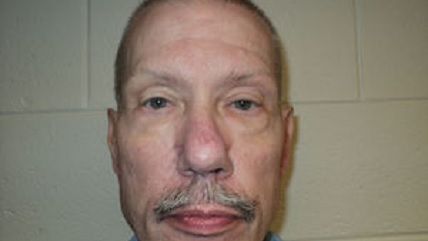Virginia's System of Injustice
Wrongful convictions like Keith Allen Harward's are made easier without open discovery rules.

Keith Allen Harward spent more than three decades in a locked cage for a crime he did not commit. Thanks to fast work by his attorneys and the Virginia Supreme Court, he walked out of prison on Friday. But nothing the state does can atone for the crime it committed against him. And the heck of it is that many more innocents just like him could be rotting behind bars. Nobody knows.
Harward was convicted for the 1982 murder of Jesse Perron and the raping of Perron's wife, Teresa. DNA evidence has now conclusively demonstrated that another man—a now-dead career criminal named Jerry Crotty—is the real perpetrator of the 1982 crime. Harward had nothing to do with it.
And the authorities probably knew that—or should have.
Swabs from the rape kit in Harward's case included blood-type evidence that, his appeal says, "excluded Mr. Harward as the perpetrator." But that evidence was "never provided Mr. Harward or his counsel. This information was not only suppressed but also falsely characterized as 'inconclusive' by the Commonwealth's forensic expert at trial."
As the Richmond Times-Dispatch's Frank Green has reported, the work of that expert—David Pomposini—also has been involved in another wrongful conviction case, concerning a man named Troy Webb. Webb spent eight years in prison for rape before DNA cleared him.
Harward and Webb are preceded by other well-known innocents set free long after conviction. Thomas Haynesworth spent 27 years in prison for rapes committed by another man. Earl Washington spent 17 years in prison for crimes that DNA proved he did not commit—including several years on death row and six more years even after his exoneration.
Still, that Harward's lawyers never got to see evidence that could have kept another innocent man out of prison—while the guilty one went free—ought to chasten the members of the Virginia Supreme Court.
A 1963 U.S. Supreme Court case, Brady v. Maryland, requires prosecutors to disclose information that could help the defense. But Virginia lets the prosecutor decide what might be helpful and what might not be. In many jurisdictions, prosecutors routinely withhold even basic information such as witness lists and arrest reports. The result is that defendants face what some call "trial by ambush." To be fair, please note that prosecutors resent that term; they say defense counsel springs surprise witnesses during trial far more often than the state does.
A couple of years ago the Virginia Supreme Court appointed a committee to study disclosure rules. It scrutinized the issue for nearly a year, and proposed major reforms. The reforms might have leaned in one direction, but they were not entirely one-sided. Prosecutors could have learned more about the case to be presented by the defense as well. Yet in a two-sentence order in November, the Supreme Court rejected the suggestions wholesale.
Which is too bad, because prosecutors don't always abide by even current discovery requirements. Prince William County Commonwealth's Attorney Paul Ebert—who was re-elected only three weeks before the Virginia Supreme Court's order—has been chastised by federal courts for his "flabbergasting" justifications for withholding exculpatory evidence.
In one instance, the case of Beltway sniper John Allen Muhammad, the evidence would not have changed the trial's outcome. But the second instance led the courts to vacate a murder-for-hire conviction. U.S. District Judge Robert Jackson, a former prosecutor himself, blasted Ebert for repeating behavior he had been warned about in the Muhammad case, and an appellate court found his withholding of evidence useful to the defense "was entirely intentional."
Ebert's justification is, essentially, that he does not want to give defendants material they might use to make stuff up. But in withholding material defendants might use to tell lies, he also is withholding material they need to tell the truth.
That's why Virginia legislators should do what the state's Supremes would not, and require more thorough discovery of pretrial evidence. This would let defense attorneys decide what is useful, rather than prosecutors—who might take a more cramped view of the question.
There's another possible reason to adopt open discovery rules: Jason Norton, a former detective with the Richmond Police Department. Two years ago sharp-eyed federal prosecutors noted that the language in some of Norton's requests for search warrants sounded awfully similar. It turned out Norton lied about confidential informants, whose information he cited as the justification for the warrants, and essentially cut and pasted language from one affidavit to the next.
Norton is no longer on the Richmond force. Chief Alfred Durham has set up an internal audit system to prevent similar instances in the future. But in the meantime, the convictions of a dozen people have been overturned, and the police department and prosecutor Mike Herring have spent God-only-knows-how-many hours sorting the whole mess out. Think of the resources wasted.
Maybe Norton is alone among the thousands of police officers throughout Virginia. But nobody knows. Giving defense lawyers routine access to prosecutors' files might have some deterrent effect in preventing similar cases. Officers would be on notice that defense lawyers would be checking their work, and might take greater pains because of it. A lot of mischief—or simple sloppiness— is possible when arrest reports and similar documents never see the light of day.
This isn't about favoring defendants over law and order. When the state locks up innocent men for crimes they didn't commit, it lets guilty men go free—free to commit further mayhem. Public safety requires more than simply getting a conviction. It requires convicting the right person. Convicting an innocent one is a crime against him, against public safety—and against the taxpayers.
This column originally appeared at the Richmond Times-Dispatch.


Show Comments (51)